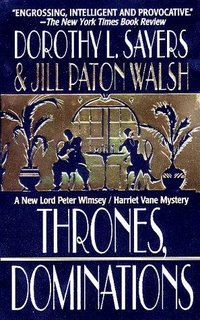
Dorothy Sayers and Jill Paton Walsh, Thrones, Dominations (1998)
I have lately been in a reading mood. After reading three novels I was less than impressed with — The Company of Strangers by Robert Wilson, And Then There Were None by Agatha Christie, The Da Vinci Code by Dan Brown — I turned to this book. Sayers is one of my favorite authors (her Nine Tailors is marvelous) and I was not disappointed with Thrones, Dominations.
One interesting aspect to this novel is that Sayers left the work unfinished; Jill Paton Walsh completed it, and quite recently too (1998 was the publishing date). I could not tell where Sayers’ prose ended and Walsh’s began.
The novel concerns two deaths, the first an accidental killing because of a misunderstanding, the second a deliberate murder. The hero of the novel is the amateur detective Lord Peter Wimsey, who has recently married Harriet Vane. (The fact that Harriet is herself a mystery writer allows Sayers and Walsh to have some fun discussing the art of writing detective fiction.)
The best parts of the novel are the conversations between the two highly intelligent newlyweds. Sometimes the banter back and forth strains credibility, especially when Harriet mentions that away from Peter she is “just sitting in the centre, like the fixed foot of the compasses, and doing a little sublunary leaning and hearkening” — which (Peter realizes instantly) is an allusion to John Donne’s “Valediction Forbidding Mourning”. He replies with his own allusion to the same poem. (p. 168)
But even though the conversations between Peter and Harriet may be full of obscure references to John Donne and other esoteric allusions, the discussions are often touching. At one point, Harriet asks Peter if it is right to bring a child into the world. The times are perilous; Hitler has just remilitarized the Rhineland. Peter’s reply contains hope and vulnerability. “There’s what we can do for any child of ours,” he says, “and there's what no one can do for any child at all.” (p. 302)
At another point in the book Harriet and Peter discuss Peter’s detective work. Harriet assures him that she thinks it is a very “serious” and important undertaking. She also expects that it is tied to his war-time service (during the First World War) but can’t quite see the connection. “When you have seen people die,” he replies, “when you have seen at what abominable and appalling cost the peace and safety of England was secured, and then you see the peace squalidly broken, you see killing that has been perpetrated for vile and selfish motives...” Now she sees the connection and he adds: “Justice is a terrible thing, but injustice is worse.” (p. 131)
In a day when Al Qaeda terrorists crash people-laden planes into crowded buildings and Hezbollah terrorists fire rocket into Israel, this is something to remember. I enjoyed reading Thrones, Dominions.


No comments:
Post a Comment